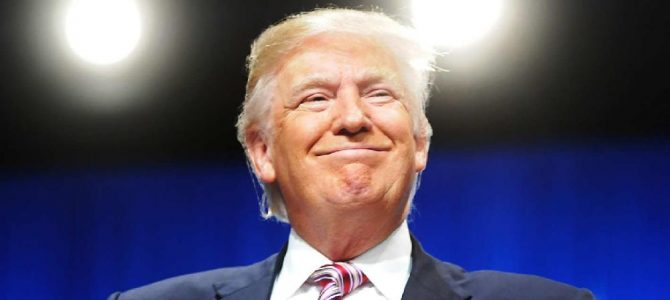
We’ve already heard that President Donald Trump is a cable news guy. He loves watching Fox and other television news shows, gets frustrated with bad news coverage from the “lamestream media,” and is prone to copious TV-watching at night, according to White House sources.
We’ve also heard that Donald Trump has a rather short attention span. He’s long been notorious for his distractibility. According to Foreign Policy, NATO officials asked heads of state to keep their remarks under four minutes for the U.S. president’s sake during its discussions last month.
Now, following a storm of controversial @realDonaldTrump tweets throughout the last week, we’re talking about the president’s use of Twitter and his social media engagement. He tweets things that contradict or disregard official White House statements, making for questionable PR practice. He occasionally makes foreign policy or national security statements that the media obsesses over, and the White House quickly contradicts. Obviously, Trump’s Twitter can be a headache for his staff. For the rest of us, it’s at times confusing, amusing, or alarming, depending on the tweet.
But how accusatory can we actually be? In demonstrating his addiction to social media and cable news, it’s become increasingly clear that Trump is just like us. Yes, we need more from our president—more professionality, decorum, dignity. But do we deserve more? Do we even want more?
The Plank In Our Collective Eye
The funny thing is, Trump’s Twitter activity has always been greeted with a sort of glee on both left and right, from the earliest days of his presidential campaign until now. Yes, there’s also horror, occasionally: from folks who fear his tweets undermine diplomacy or national security, from the White House team whom his candor contradicts.
But Trump’s enemies seize upon every tweet as a sign of increasing decay and corruption. Those tweets feed their mantra of doom. They make for good headlines, and welcome both snark and ire. And more often than not, one must admit, Trump’s tweets help legitimize their furor—he’s not a deliberate or thoughtful tweeter. He’s a reactionary one, whose tweets often seize upon emotional grandstanding rather than diplomatic messaging.
Trump’s supporters, on the other hand, delight in his ability to smash the status quo and the polished façade of establishment politics. They like his contradictory, contrarian nature. The tweets he posts fit this profile perfectly: they capture the unpredictability, the outrage, the reactionary grandeur of Trump. He won’t be put in a box, even when he limits himself to 140 characters.
Our Society’s Obsessed With Social Media
But Trump’s tweets and TV-watching habits reveal more about our society than this. Our president mirrors our own technological activity, across generational divides. Trump’s part of a generation that often gravitates to cable news, as well as to talk show radio. Many Baby Boomers utilize Facebook and Twitter for familial connection, but social media has also increasingly become a political tool—one they use to embrace their political and cultural bubbles.
Younger generations may watch less cable, but we’ve replaced it with Hulu, YouTube, and Netflix. We spend more, not less, time online. Our Facebook and Twitter feeds are often prey to the same insular—and vehemently political—habits that Trump’s are. We tend to engage in as much grandstanding, albeit from a different political bias or angle. According to recent studies, our collective attention span is shorter than that of a goldfish—we can focus on something for an average of about eight seconds.
We ought to be able to demand more from our president and leaders, sure. But this is another instance in which Trump, while he may not be the president we need, is surely the one we deserve. We increasingly live in a Neil Postman society—in which we jump from sensational headline to sensational headline, in which we are quite happy “amusing ourselves to death.” In this society, the antics and sensationalism of Donald Trump fit the presidency all too well. He knows the entertainment machine, and he knows how to feed it. He’s been a reality TV star. For all his inexperience in the realms of politics and policy, Trump is not inexperienced when it comes to entertaining and/or horrifying us.
We follow Trump on Twitter, and latch upon every gaffe and incendiary comment, either to make “nasty woman” and “bad hombre” T-shirts, or to add #covfefe to every single thing we post on Instagram and Twitter.
We’re outraged with Trump’s lack of professionality, his diversion from the dignified presidential stereotype we hold near and dear. Yet we can’t stop talking or tweeting about what Trump says and tweets. People need to make up their minds: do they hate Trump’s Twitter, or love it?
We Just Can’t Look Away
So long as Trump gets our attention, he’ll keep tweeting. Here, too, he’s just like the rest of us: eager for accolades and attention, fueled by likes. Can we really get angry at someone who’s much like a funhouse mirror, showing us a distorted—yet still truthful—depiction of ourselves?
Lately, whenever I think of Trump’s Twitter, I think of Lemony Snicket’s “A Series of Unfortunate Events.” His books always began with a warning not to keep reading. In Netflix’s new rendition of the series, starring Neil Patrick Harris, each episode started with the song “Look Away.” The gist and irony of that song, and of the books, is this: we like the drama and the tragedy. Even if we know things aren’t going to turn out well, we can’t look away. Even if it wrecks “your evening, your home life, and your day.”
Many people out there think Trump’s a bad president, and a dangerous one when he tweets. Yet, ironically, they can’t manage to look away. That’s because all of us, if we would, must admit that we are just as obsessed as he is.









